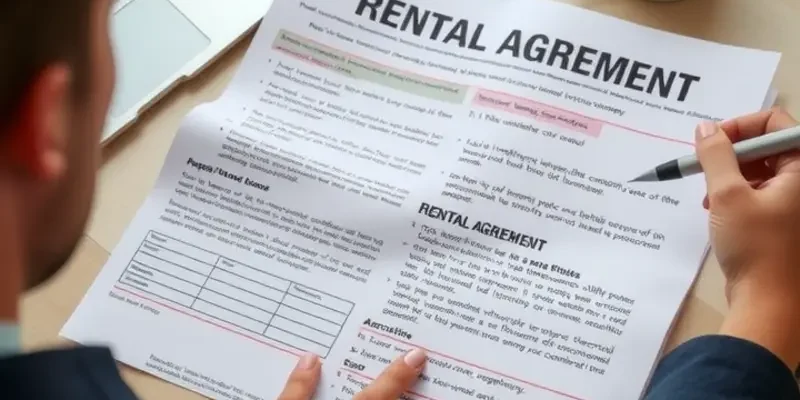Navigating the rental market can be overwhelming, especially for young professionals, students, couples, and families renting their first homes. Understanding your financial rights as a tenant is crucial not only for ensuring a smooth leasing experience but also for protecting your financial interests. Whether you are dealing with security deposits, monthly rent, or added fees, being well-informed will empower you to make the best financial decisions. This guide will break down key financial aspects of leasing in the U.S., providing practical tips and resources to help you understand your rights and responsibilities as a tenant. By equipping yourself with this knowledge, you can approach your rental journey with confidence and clarity, ultimately fostering a positive landlord-tenant relationship.
Know Your Lease: Understanding Key Terms

Signing a lease can feel daunting, especially for first-time renters. Understanding key terms is crucial to avoid financial pitfalls. A lease is a legally binding contract, so it is essential to scrutinize every detail before signing. Here are vital elements to focus on:
Rent Amount: Ensure the agreed rent is correctly stated in the lease. Check for additional charges like parking or pet fees. This clarity prevents unexpected financial burdens.
Due Dates: Familiarize yourself with the rent due date and acceptable payment methods. Late fees can accumulate quickly; knowing the precise timeline helps in planning your finances and avoiding penalties. For guidance on disputing unfair late fees, explore more here.
Security Deposits: A common requirement, the security deposit is usually equivalent to one or two months’ rent. Verify the conditions for its return, such as cleaning requirements or property damage assessments. Understanding this helps secure your funds at lease end.
Maintenance Obligations: Leases often outline the division of responsibilities between landlord and tenant regarding property maintenance. This includes handling repairs or addressing issues like plumbing or heating. Clarifying these terms ensures you aren’t unexpectedly charged for repairs.
Thorough Review and Questions: Before signing, read your lease multiple times. Each clause has potential financial implications. Don’t hesitate to ask the landlord for clarification on unfamiliar terms. Discuss and try negotiating any unfavorable terms.
Addressing Unclear Terms: If a section seems ambiguous, request a written clarification or amendment. This action prevents misinterpretations later that could lead to disputes.
Tenant Protections: Know your rights and protections under state and local laws. These laws often govern security deposit returns, rental increases, and property maintenance. Awareness of these aspects bolsters your position in negotiations, protecting your financial welfare.
By understanding these components, you mitigate financial risks associated with renting. Ensure every part of the lease agreement is transparent before committing, safeguarding both your present and future interests. This diligence doesn’t just protect your finances; it empowers you as a tenant.
Your Rights: Security Deposits and Beyond

Security deposits are one of the first financial interactions between tenants and landlords and can significantly impact your rental experience. At the federal level, there are no overarching laws concerning security deposits; instead, each state has developed its own regulations. For instance, in California, the security deposit cannot exceed two months’ rent for unfurnished units and three months for furnished ones. New York and Texas have no set maximum, but the industry standard is often one month’s rent.
The timeline for returning security deposits also varies. In Pennsylvania, landlords have 30 days to return the deposit, while in Vermont, the period extends to 60 days if no other date is stipulated in the lease. Generally, landlords must provide a detailed statement if any deductions are made. Common deductions include unpaid rent, damage beyond normal wear and tear, and cleaning charges necessary to return the unit to its original state.
Beyond security deposits, tenants’ rights extend to the maintenance and repair of the rental unit. These rights ensure landlords must provide habitable living conditions. If essential repairs are needed, such as faulty heating or leaking roofs, landlords are typically required to address them promptly. In many states, tenants can be financially proactive by arranging repairs themselves after giving the landlord adequate notice and subsequently deducting the cost from their rent—though this must be handled carefully to avoid legal complications.
Common disputes often arise around security deposit refunds and repair issues. For instance, landlords might claim excessive damage requiring steep deductions, or tenants might face unaddressed repair requests that affect their living quality. When disputes occur, communication is vital. Document all correspondence and attempt an amicable resolution first. If unsuccessful, local tenant advocacy groups can be invaluable.
Sometimes, disputes may escalate to small claims court. Typically, these proceedings do not require legal representation and can be a feasible route if you believe your rights have been violated. However, understanding your state’s laws is crucial, as they govern both small claims procedures and your rights as a tenant.
Being informed and prepared can prevent many potential pitfalls that first-time renters may encounter. For further guidance on lease disputes, check out our resource on disputing rental late fees, which offers insights into handling these common disagreements efficiently.
Final words
Understanding your financial rights as a tenant is paramount to ensuring a positive rental experience. By learning the core elements of your lease agreement and knowing your rights regarding security deposits and maintenance, you can significantly reduce the likelihood of conflicts and enhance your housing experience. Remember, good communication with your landlord and thorough documentation are your best tools when navigating any rental situation. By staying informed, you protect not only your financial investment but your peace of mind as well. Step confidently into your next rental journey with these essential insights.









